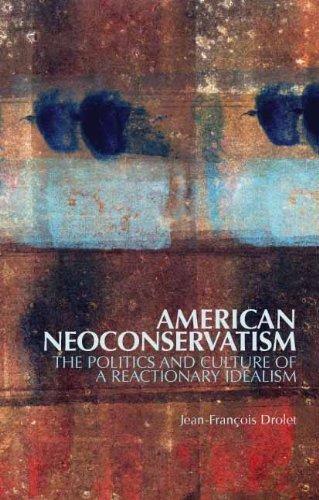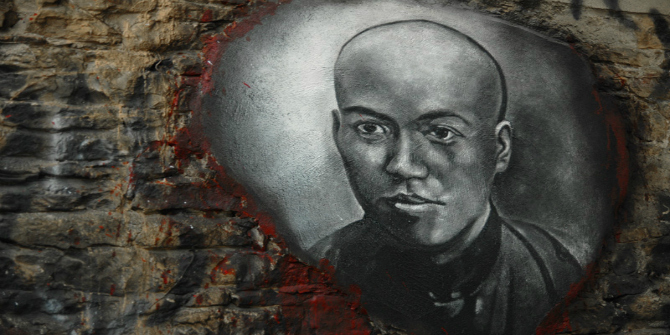 In this book, Jean-Francois Drolet contributes to a critical engagement with neoconservatism at the level of its intellectual foundations. Situated at the interface of the disciplines of IR, political theory and the history of ideas, the book moves beyond recent debates over the intricacies of the Bush administration’s foreign policy to offer a deeper look at the philosophical premises of this ‘new’ conservatism in light of the historical events and changing social compacts that have created a demand for it over the past decades. This is a rich piece of work in which Drolet demonstrates an encyclopaedic knowledge of neoconservatism, finds Daniel Sage.
In this book, Jean-Francois Drolet contributes to a critical engagement with neoconservatism at the level of its intellectual foundations. Situated at the interface of the disciplines of IR, political theory and the history of ideas, the book moves beyond recent debates over the intricacies of the Bush administration’s foreign policy to offer a deeper look at the philosophical premises of this ‘new’ conservatism in light of the historical events and changing social compacts that have created a demand for it over the past decades. This is a rich piece of work in which Drolet demonstrates an encyclopaedic knowledge of neoconservatism, finds Daniel Sage.
 American Neoconservatism: The Politics and Culture of a Reactionary Idealism. Jean-Francois Drolet. C Hurst & Co. June 2011.
American Neoconservatism: The Politics and Culture of a Reactionary Idealism. Jean-Francois Drolet. C Hurst & Co. June 2011.
Neoconservatism has been one of the most powerful and influential ideologies in global politics during the past three decades. The rise of its ideas in the US, and its arguable influence in Britain – with respect to both the Conservatives and Labour – has had profound effects on domestic policy developments and, as is most widely thought of, foreign policy. But to what extent do we genuinely understand the ideological drivers and foundations of neoconservatism? In this deep and rich account, Jean-Francois Drolet forensically explores and exposes the underpinnings of the ideology and delivers a striking blow to the belief that neoconservatism is at its heart a liberal variant of conservative ideology, a belief articulated most forcefully by proponents of the movement, the ‘neocons’.
Drolet begins his account by outlining the initial catalysts that led to the emergence of neoconservatism as a bona fide and relatively coherent doctrine. Like the roots of Thatcherism in the UK, Drolet locates the genesis of neoconservatism in the collapse (and what many saw as the corruption) of the post-war consensus from the 1960s. In particular, the early proto-neoconservatives were initially united by a shared unease and distaste with rise of the New Left and how, as Drolet puts it, “American liberalism had fallen prey to what they saw as the misguided utopianism and destructive cultural relativism of the counter-culture”. The key task of the early neoconservatives was to recapture the political ground from the ‘New Politics’ by reaffirming and returning to the traditional ideology and values of American liberal democracy. In a particularly challenging yet accomplished chapter, Drolet singles out Leo Strauss – the German émigré philosopher who settled in the US – as the central theoretical influence of the neoconservative movement.
The three subsequent chapters in American Neoconservatism focus on the impact that the movement has had on US public policy. In one chapter, the relationship between neoconservatism, capitalism and the welfare state is examined, with Drolet quite correctly arguing that these relationships are far more complex than is often credited. With regards to the welfare state for example, conservatism and neo-liberalism are often referred to interchangeably vis-à-vis to a desire to roll back the contours of social provision. Yet Drolet argues that the neoconservative vision of welfare is far more nuanced than the traditional neo-liberal vision of (at best) a safety net of social security. On the one hand, neoconservatives agree with neoliberals that the welfare state should not aim to correct market inequalities in order to promote economic egalitarianism. Yet on the other hand, neoconservatives are not necessarily concerned with reducing the size of the welfare state. Rather, they are interested in restructuring the welfare state to promote conservative values, such as the work ethic, the family and law and order. This discussion highlights the overwhelmingly moral demands of neoconservatism; demands that sometimes overlap with those of neoliberalism, but are far from identical and are premised on entirely different ideological foundations.
This polarity – between the values of liberalism and neoconservatism – is ultimately the central thesis of Drolet’s analysis. And nowhere is this polarity more obvious than in the terrain of foreign policy: the realm in which the influence of neoconservatism has been the most profound. Neoconservatives have infamously declared themselves committed to liberal democracy, so much so that the overwhelming legacy of neoconservatism will be its proponents attempts to purportedly entrench and export the liberal ideal beyond the shores of America.
Yet for Drolet, this association – of neoconservatives as true disciples, protectors and exporters of liberalism – is deeply misguided. In its concern and support for values and institutions beyond the individual – the family, the community, the nation and the common good – the true values of neoconservatism are undoubtedly illiberal and fundamentally conservative. Drolet outlines this tension by highlighting the inherent contradictions of neoconservatism. Thus the concern of the neoconservative is not with the freedom that capitalism brings but the social control it exerts and the hierarchy it reproduces; not with the spreading of liberal democracy but the maintenance of American hegemony. As Drolet argues, “it talks the language of freedom, self-determination and human rights to mobilise an anomic and hedonistic civil society for the cause of empire”. Drolet’s interpretation is of a cynical – and perhaps even nihilistic – ideology.
This is a rich piece of work in which Drolet demonstrates a singular and almost encyclopaedic knowledge of neoconservatism. It is also varied and cuts across a range of disciplines, such as philosophy, economics, social policy, law and foreign policy. It is a challenging and sometimes demanding study, but with a crucial central message. This is that conservatism and liberalism – despite the crossing of paths during recent decades – remain distinct and unique political ideologies, often holding contradictory visions of how society should be shaped. This is a valuable lesson of which to be reminded. And one that might help us understand the seemingly fragile relationship between the conservative David Cameron and the liberal Nick Clegg.
——————————————————————————————-
Daniel Sage is a PhD student at the University of Stirling. His PhD thesis explores how welfare-to-work reforms have affected the experiences and interactions of benefit claimants with the welfare system. Additionally, he has academic interests in income inequality and social cohesion, public attitudes towards the welfare state and the politics and philosophy of social policy. He has a BA in History from University College London and an MSc in Social Policy from the LSE. He tweets at @djsage86 and blogs at http://knowledge-is-porridge.blogspot.com. Read reviews by Daniel.







